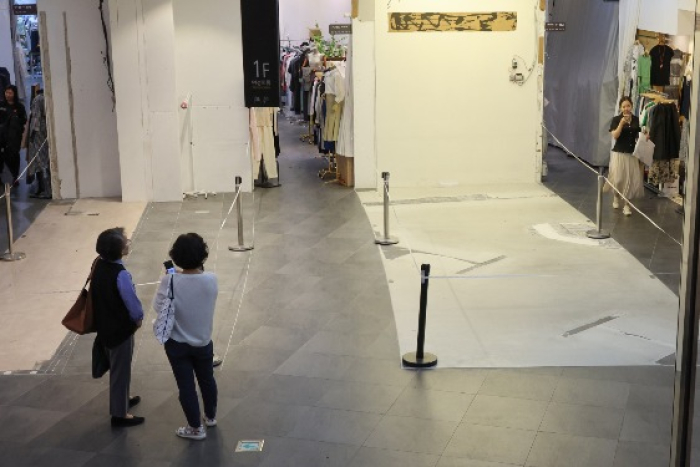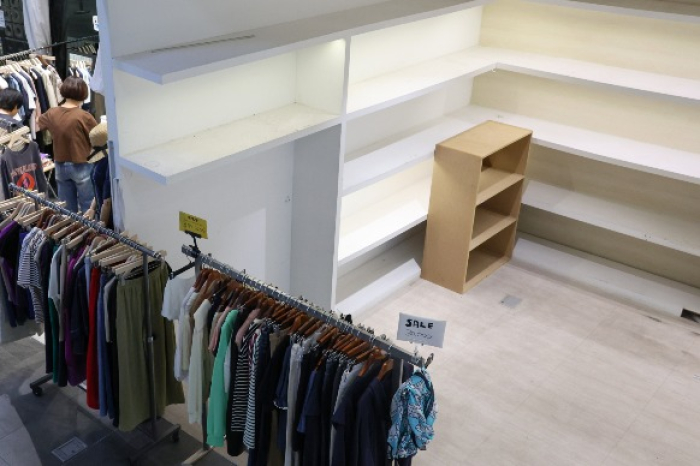Korean shopping mecca Dongdaemun Market's vacancy rates soar
Some landlords in the fashion district are offering rent-free leases to reduce vacancies
By May 31, 2024 (Gmt+09:00)
Samsung steps up AR race with advanced microdisplay for smart glasses


When in S. Korea, it’s a ritual: Foreigners make stops at CU, GS25, 7-Eleven


Maybe Happy Ending: A robot love story that rewrote Broadway playbook


NPS yet to schedule external manager selection; PE firms’ fundraising woes deepen


US auto parts tariffs take effect; Korea avoids heavy hit



The fashion town in Seoul had long attracted young shoppers in their 20s and foreign tourists in search of cheap trendy clothes. But it has lost its luster since the mid-2000s amid the rise of online shops.
Making matters worse, Chinese e-commerce players such as AliExpress, Temu and Shein are even eating away at Korean offline malls' share in the ultra-cheap clothing market.
Korean cheap clothing manufacturers retain comparative advantages over Chinese products in terms of quality and design. But the gap is being rapidly narrowed, said fashion industry officials.
As of the end of March, the vacancy rate at 14 of the 32 shopping malls in the Dongdaemun fashion district reached the double digits on average, according to the Dongdaemun Fashion Town Special Tourism Association.
The vacancy rate at the Maxtyle shopping mall, which accommodates 2,654 stores, stood at 86%.
Vacancy rates at two other fashion malls, Designer Club and Good Morning City, stood at 77% and 70%, respectively,
“More than half of the clothes distributed in Dongdaemun have been replaced by Chinese products," said a fashion industry official.
“You can order similar clothes at low prices from AliExpress and Temu, so who would visit Dongdaemun?”
Dongdaemun Market used to be crowded with retailers chartering buses from all over the country to buy in bulk. But those days are gone.
China’s ban of group tours to Korea in retaliation for Seoul’s decision to deploy the Terminal High Altitude Area Defense (THAAD) in 2016 and the COVID-19 outbreak dealt heavy blows to Dongdaemun Market.
Even with the lifting of the travel ban and the pandemic's end, there are few signs of recovery in the fashion town.
Some store operators in Dongdaemun said that the number of foreign buyers visiting the Dongdaemun wholesale market has decreased noticeably.

RENT-FREE LEASE
Korean retailers are also turning to Chinese wholesalers and e-commerce platforms away from Dongdaemun.
Linkshops, a domestic wholesale fashion platform founded in 2012, went out of business earlier this year due to a drop in transaction volume.
It was the first platform that connected wholesalers and retailers in Dongdaemun and had received close to 20 billion won ($15 million) in investment from a venture capital firm.
Gollala, another wholesale platform based in Dongdaemun, shut down last year.
To revitalize the area, some fashion industry officials suggest that cultural facilities be built in the fashion town, which would need the nod from several hundred store owners in the area.
Given the difficulty of winning the approval of a majority of shop owners there, Ji Dae-shink, a director of the Dongdaemun Fashion Town Special Tourism Association, proposed a revision of law to convert the commercial district into a mixed-use area.
Write to Ji-Yoon Yang and Hyun-Jin Ra at yang@hankyung.com
Yeonhee Kim edited this article
-
 E-commerceKorea scraps ban on online purchase of 80 items from abroad
E-commerceKorea scraps ban on online purchase of 80 items from abroadMay 19, 2024 (Gmt+09:00)
2 Min read -
 FashionNative Korean fast-fashion brands poised to snatch market
FashionNative Korean fast-fashion brands poised to snatch marketMay 08, 2024 (Gmt+09:00)
3 Min read -

-
 FashionLF’s fashion brand Dunst teams up with E-Land for China push
FashionLF’s fashion brand Dunst teams up with E-Land for China pushApr 01, 2024 (Gmt+09:00)
2 Min read -
 RegulationsSouth Korea gets tough with Chinese platforms AliExpress, Temu, Shein
RegulationsSouth Korea gets tough with Chinese platforms AliExpress, Temu, SheinMar 13, 2024 (Gmt+09:00)
3 Min read -
 E-commerceAliExpress’ zero-commission offer jolts Coupang, Naver
E-commerceAliExpress’ zero-commission offer jolts Coupang, NaverJan 31, 2024 (Gmt+09:00)
2 Min read -
 Real estateSeoul office leasing turns lender’s market as vacancy rates at 2023 low
Real estateSeoul office leasing turns lender’s market as vacancy rates at 2023 lowNov 28, 2023 (Gmt+09:00)
1 Min read -
 Korean startupsKKR leads $190 mn Series C funding of fashion platform Musinsa
Korean startupsKKR leads $190 mn Series C funding of fashion platform MusinsaJul 19, 2023 (Gmt+09:00)
1 Min read


